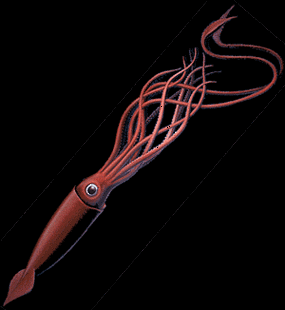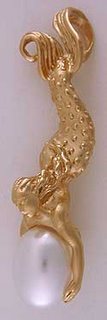Eyes In The Dark

[EDITORS' NOTE: After crossing the Pacific Ocean in a light balsa raft, explorer Thor Heyerdahl recounted his adventure in his popular 1948 memoir Kon-Tiki: Across the Pacific by Raft. In this excerpt, Heyerdahl has a close encounter with mysterious sea creatures.]
When night had fallen and the stars were twinkling in the dark tropical sky, the phosphorescence flashed around us in rivalry with the stars, and single glowing plankton resembled round live coals so vividly that we involuntarily drew in our bare legs when the glowing pellets were washed up round our feet at the raft's stern. When we caught them we saw that they were little brightly shining species of shrimp. On such nights we were sometimes scared when two round shining eyes suddenly rose out of the sea right alongside the raft and glared at us with an unblinking hypnotic stare. The visitors were often big squids, which came up and floated on the surface with their devilishly green eyes shining in the dark like phosphorus. But sometimes the shining eyes were those of deep-water fish that only came up at night and lay staring, fascinated by the glimmer of light before them. Several times, when the sea was calm, the black water round the raft was suddenly full of round heads two or three feet in diameter, lying motionless and staring at us with great glowing eyes. On other nights balls of light three feet or more in diameter would be visible down in the water, flashing at irregular intervals like electric lights turned on for a moment.
We gradually grew accustomed to having these subterranean or submarine creatures under the floor, but nevertheless we were just as surprised every time a new version appeared. About two o' clock on a cloudy night, when the man at the helm had difficulty in distinguishing black water from black sky, he caught sight of a faint illumination down in the water that slowly took the shape of a large animal. It was impossible to say whether it was plankton shining on its body, or whether the animal itself had a phosphorescent surface, but the glimmer down in the black water gave the ghostly creature obscure, wavering lines. Sometimes it was roundish, sometimes oval, or triangular, and suddenly it split into two parts, which swam to and fro under the raft independently of one another. Finally there were three of these large shining phantoms wandering around in slow circles under us.
These were real monsters, for the visible parts alone were some five fathoms long (30 feet), and we all quickly collected on deck and followed the ghost dance. It went on for hour after hour, following the course of the raft. Mysterious and noiseless, our shining companions kept a good way beneath the surface, mostly on the starboard side where the light was, but often they were right under the raft or appeared on the port side. The glimmer of light on their backs revealed that the beasts were bigger than elephants but they were not whales, for they never came up to breathe. Were they giant ray fish which changed shape when they turned over on their sides?
They took no notice at all if we held the light right down on the surface to lure them up, so that we might see what kind of creatures they were. And, like all proper goblins and ghosts, they had sunk into the depths when the dawn began to break.
-This story was taken from the book Kon Tiki by Thor Heyerdahl, 1948. It appears in the book Chicken Soup for the Ocean Lover's Soul by Jack Canfield, Mark Victor Hansen, and Wyland.



